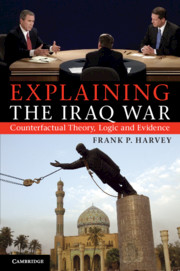Book contents
- Frontmatter
- Contents
- Figures
- Tables
- Acknowledgments
- Introduction
- 1 Comparative counterfactual analysis and the 2003 Iraq war
- 2 Leadership, political context(s) and the Iraq war
- 3 Democratic national security advisers
- 4 Domestic and congressional politics
- 5 American intelligence failures and miscalculations
- 6 Societal pressures and public opinion
- 7 International politics, global WMD consensus and UN power balancing
- 8 Hussein’s mistakes, miscalculations and misperceptions
- 9 Summary and implications
- 10 Conclusion
- Bibliography
- Index
8 - Hussein’s mistakes, miscalculations and misperceptions
Published online by Cambridge University Press: 05 June 2012
- Frontmatter
- Contents
- Figures
- Tables
- Acknowledgments
- Introduction
- 1 Comparative counterfactual analysis and the 2003 Iraq war
- 2 Leadership, political context(s) and the Iraq war
- 3 Democratic national security advisers
- 4 Domestic and congressional politics
- 5 American intelligence failures and miscalculations
- 6 Societal pressures and public opinion
- 7 International politics, global WMD consensus and UN power balancing
- 8 Hussein’s mistakes, miscalculations and misperceptions
- 9 Summary and implications
- 10 Conclusion
- Bibliography
- Index
Summary
It should be clear to anyone exposed to all relevant facts from this case that American, British and UN (UNSCOM and UNMOVIC) intelligence estimates on Saddam’s WMD programs were seriously flawed (see Chapter 5) – as were dozens of major intelligence reports produced by Germany, France, Russia, and almost every think tank and organization with a mandate to track global WMD proliferation. Everyone overestimated the threat(s) from the Iraqi regime, and no one at the time issued definitive statements on record that came close to what turned out to be the truth. But these serious errors account for only half of the mistakes that were directly responsible for the decisions leading to the 2003 war. The Iraqi regime, not surprisingly, was also plagued by serious intelligence errors and prone to making bad decisions based on dangerous strategic miscalculations. The effects of these mutually reinforcing misperceptions were aptly described by Tenet (2007):
I did not think he was bluffing, either. With the quality of UN inspections growing weaker over time, the political will to maintain sanctions fading, and Saddam’s coffers ballooning through the Oil-for-Food program, I had little doubt in my own mind what Saddam was up to. I believed he had WMD and I said so. From then on, after UNSCOM’s departure, we had to rely more on analysis and extrapolation of more nuanced technical data … Yet Saddam gave us little reason to believe that he had changed his stripes … [He] was a fool for not understanding, especially after 9/11, that the United States was not going to risk underestimating his WMD capabilities as we had done once before … Before the war, we didn’t understand he was bluffing, and he didn’t understand that we were not.
It is impossible to fully appreciate the causes of the Iraq war without acknowledging the role and impact of Saddam’s mistakes. Critics of US and UK decision-making will immediately demand a higher standard for Western intelligence, but it would have been irresponsible for intelligence officials to completely ignore signals coming out of Iraq or to assume Saddam was making a series of dangerous miscalculations and strategic blunders. Clearly, Western intelligence communities should have given serious thought to the possibility that Saddam had nothing substantial to hide, but it was, for obvious reasons, not the best time in American history for any official in Washington to reject the combined intelligence on Saddam’s WMD that had been compiled over the previous decade. This alternative assessment – i.e., that Saddam was foolish enough to fabricate the myth of his regime’s WMD capabilities because of an irrational and largely unsubstantiated fear of an attack from Iran – was not a credible interpretation of his behavior. Never underestimating your opponent’s sanity or intelligence is usually the first rule leaders are cautioned to follow during any crisis. In this context, downplaying the threat from Saddam’s WMD would have been viewed by almost everyone as reckless and irresponsible.
- Type
- Chapter
- Information
- Explaining the Iraq WarCounterfactual Theory, Logic and Evidence, pp. 241 - 264Publisher: Cambridge University PressPrint publication year: 2011



